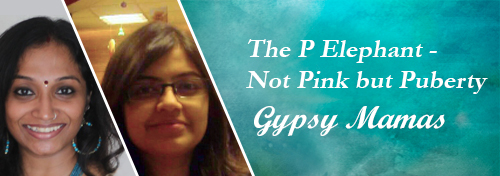The P Elephant – Not Pink but Puberty
We are the Gypsy Mamas, two mothers. A mother of two chirpy young girls and a mother of a young boy. We hear questions, see actions and understand their thoughts. This series, ‘The Elephant In The Room’, is an attempt to indirectly touch and impact childhood values and hoping in turn we will all together build a beautiful generation. A generation that is aware and sensitised to as many elements of life as possible. As parents, let us enable this. In this series, we hope to discuss topics like sexuality and private space that make us uncomfortable around our children.
Our society, the uncles and aunts who live next door, teachers, everyone around children are concerned or rather are talking about them. Especially the raging balls of hormones, that is in their adolescence. They are always a favorite topic of discussion amongst the elders. ‘Look, how that boy behaves’, ‘See, how she dresses up’, ‘How much/less they talk, walk and oh!’
But for the parents who deal with children every day, the questions they face are from the other side. From the mouth of the teenagers themselves, “Mumma, why don’t you understand?”, “Pappa, it’s not like your times”, “Why can’t you let me do this?”, “What’s wrong? Why can’t I wear this?”
When did your cute, obedient and usually silent child become a mountain of questions? Are you facing a knot of confusions? When did your chirpy, happy and ever-smiling active child suddenly change into a moody monster? Parents are often left wondering, “Where did my child disappear? What has happened to him/her?” No time to fret, they are still in there. They are just getting ready to cross the bridge between childhood and adulthood.
So do remember, this isn’t a jolly ride for the children either. They are told they are too small to do many things, and at the same time, they are also told, “Come on, you can do this. You are a big boy/girl.”
They are allowed to watch all the sleazy item numbers on TV, sing and dance along with it, but they are not allowed to watch ‘certain’ scenes because they are not grown up! This is all just so confusing! Do we ever think about it? And if this isn’t enough, these young adults suddenly have hair growth on their body. The girls have their breasts growing and the boys, they have their voice cracking! Just imagine how worrying this must be for them! And what do we parents do? Avoid? Act as if nothing has changed or act like we are too busy and we haven’t noticed the changes? Ignorance is bliss for us, but for them? How do they feel?
Isn’t it right for them to have questions about their changing bodies and feelings? They suddenly seem curious about the opposite gender and have feelings which appear completely alien to them? Oh yes! We have been there and done it. We know all of it so well, right? But, wait – if that’s the case, do we take time to think about and answer their questions?
So, this time – we chose this phase we refer to as ‘puberty’ to talk about. This is probably one of the phases that can get very difficult for children and more sometimes, when we, as parents, fail to recognise and acknowledge it. Both, boys and girls, go through this rough phase and this is a time that they really need us, but might not just ask for it. It might be a tad bit uncomfortable or embarrassing for us to answer all their questions, but remember – we’ve been there and we know how confusing it is. Let’s walk the talk together with them.
We chose some parents and asked them about their experience with the young adults in their lives. Their answers were surprising, and reassuring! It says, “Yes, we are also confused.” “No, we don’t always know all the answers, but we try!” Tina, mother of 2 says that although she knew all the technicalities, she had a hard time breaking it down to the level of a 9 year old. But she has finally succeeded. So, let’s find some answers together, and make sure that we can talk to our children when they reach the bridge of adolescence!
What is puberty?
According to wikipedia, “Puberty is the process of physical changes through which a child‘s body matures into an adult body capable of sexual reproduction to enable fertilization.”
Didn’t we hold their hands as they learnt to walk, skip, jump, swim and read? When they are undergoing their journey from childhood to adulthood, don’t we want to help them along?
When does puberty begin?
We asked Dr. Shaibya, who works with Enfold India, this question to which she answered, “This is like asking how and when does the child grow in height?”
We really cannot put a start age for this phase. Children could begin puberty as early as 8 years or as late as 16. So, what do we mean by ‘start of puberty?’ Dr. Shaibya says it’s when the brain starts to send out signals to the different parts of the body to start growing and changing.
So, I think it is important for us, parents, to understand that our young adults do not change voluntarily. It happens to them. And they are as uncomfortable about it as their parents were at that age, if not more. Remember your 2 year old who would throw tantrums all over the place, how did you handle him/her then? I believe with lots of love and a bit of understanding. The same applies for our teens too.
What are some of the changes that happen during puberty?
Let’s now look at some of the changes that happen to boys and girls during this phase.
- Physical growth, as in gain in weight and height
- Hair growth on the body (armpits, pubic region, facial hair)
- For girls: breast enlargement, pimples/acnes may appear, menstruation
- For boys: penis erection, voice cracking
Parents and puberty
We spoke to a few parents who have sons/daughters going through this phase. We asked them what the common doubts their preteens or teens have. And here’s a short list of those questions.
- When will my breast become like yours mama?
- Is one of my breasts smaller than the other?
- When can I wear a bra?
- Why do I have hair in my arm pits?
- When will my voice change?
- Why does my penis harden?
Sounds similar? Have you heard these questions before? If yes, know that you are not alone and the questions that you are being asked are normal (It’s a sign that your child still trusts you to be their major source of information. No Google yet ;))
We asked them if they were open to talking to them about these topics. Few of them told us, they gave them information on a need-to-know basis, while a few others said they’ve kept the communication open with their children. The children are free to ask anything, anytime. There are also parents who prefer to ignore these questions. Dr Shaibya says, “Why can we not talk about these to them, just as we talk about crossing the road? How different is it?” It is information after all for their safety too.
Anne (name changed on request), mother of 2, says, “I am always open to questions. My children know that they can ask me anything anytime and I will tell them. There is nothing that I will hide from them. I had already told my daughter about menstruation and so, she did not panic when she bled for the first time”.
Most of the mothers have sensitised their daughters about menstruation, which is a positive step. But who is answering the boys? Why don’t mothers talk about menstruation to the boys too? Aren’t they watching all the Whisper and Stay-free ads on television? Don’t they see the sanitary pads with blue ink poured onto it and what would they be thinking?
If we don’t answer, Google will
With the onset of the Internet, especially Google, understand that they don’t really need you. If they still come to you with questions and you don’t answer them, they are going to figure it out sooner or later and it might not be the most unadulterated version of the information.
Like in this video clip, a child who looks around 7 or 8 years old asks his parents a question that most parents dread.
You certainly don’t want your children finding all this wrong and unwanted information on the Internet at this inappropriate age. If we speak to them, we can explain things in an age-appropriate manner.
As Dr Shaibya points out, “Parents find it difficult to talk to children because most of the time they really do not know what to say. It has never been taught to them. What language to use?” A few of the parents whom we spoke to also resonated the same opinions. Vineetha, mother of an 8 year old, said that their parents hadn’t spoken to them about these topics and they always found it difficult to find the right words to speak their children regarding sensitive issues like sex, sexuality and others. On the other hand, a mother whose parents spoke to her about everything and anything found the same comfort while talking to her children too.
In retrospect, a vicious circle is put in play when we shy away from discussing openly to our children. When we talk to them, not only do we clear paths of communication for our children, but for all the generations to come. “It’s in our very own upbringing to consider topics around sex and sexuality in the light of shame. When that is how we feel about it, how do we talk about it to children? It is colored with shame and discomfort. We are afraid that our children will go and experiment whatever they are told.” Dr Shaibya affirms.
Let us not be afraid. Let us take this journey with our children and learn and unlearn in the process. Let us amaze ourselves as we break down our walls and build an environment of knowledge for our children. Let us face our demons of shame and discomfort for the safety of our children. Let them know. Knowledge with your companionship cannot go wrong for them. We may all have our blind spots, but let them not be of ignorance.
Next in the series, some of the dandiest questions these young adults ask and we work with some experienced hands to get you the best replies.
Note: Our sincere thanks to Dr. Shaibya who works with Enfold, for taking out her valuable time to talk to us on this topic. Special thanks to the parents who were open to discuss their views and ways of handling puberty.
You can check the Part 1 of the Elephant in the Room Series here.
Uma is a mother of a three-year-old boy, and Rashmi has two daughters aged five and one. They were introduced to each other by their husbands who are great friends, and today, they believe their meeting was a moment of serendipity. They share their passion for reading, writing and children. They are both Gemini women, which means they are really four! Motherhood has been a turning point in both their lives, a journey in which they are co-travellers. They hope to enjoy this ride to the fullest, with lots of fun, grace and honesty.


